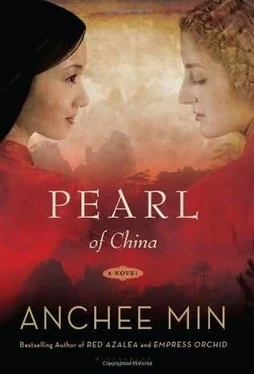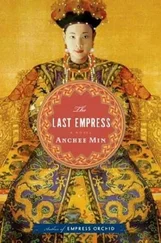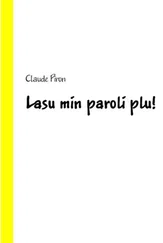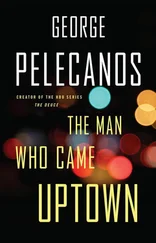“Take your time,” she said.
I froze. I couldn’t believe my eyes.
“Old friend, have you already forgotten me?” She smiled.
I stared, recognizing the long, bony fingers. “Madame Mao, is that you?”
“Yes, it’s been a long time.” She smiled. “See, I didn’t forget you.”
She offered to shake my hand.
I refused, explaining apologetically that my fingers smelled of urine.
Madame Mao withdrew her hand. “The Chairman sends his greetings. As you can imagine, he’s been very busy. I’d like to work with you toward a solution that will please him.”
“How could I possibly be useful to you?” I said.
“Comrade Willow Yee, I am offering you a great opportunity. You can change your life by proving your loyalty to the Chairman.”
It was hard to figure out the meaning of her words. She looked changed since the first time I had met her in Yenan. Still imposing, the Madame Mao in front of me today had dyed her hair ink black. Her eyes said, “I am powerful.” She kept herself in shape physically, but she was no longer a beauty. Although her eyebrows were still as thin as a shrimp’s feelers, the dark-framed glasses took away her femininity.
“I see that you are hungry,” she said, showing her bright white teeth. “Would you like to start lunch?”
Before I could answer, she clapped her hands.
A door on the far side of the room opened.
“A private banquet has been waiting for you,” Madame Mao said cheerfully, as if we were at a party.
The servants came and lined themselves up against the wall.
Stretching out her arms, Madame Mao took up my hands. “Let’s have a heart-to-heart chat, just the two of us.”
“We are fighting a cultural war with the Western countries led by America,” Madame Mao said dramatically. Her thin lips quivered. She reached out and grabbed my hands again and squeezed them. “We will defeat the American cultural imperialists. We will chase them to the end of the universe. They will have no time to catch their breath!” She shivered as if she was cold.
“Excuse me…” I didn’t know what to say.
She put a hand up in a let-me-finish gesture and continued. “When we succeed, we will take over the Capitalists’ propaganda machine. We will have our voice heard and views printed in the newspapers of the world. Imagine-the New York Times, the London Times. It will be the victory of the proletarians of the world! The Chairman will be so proud of your efforts!”
“I am not quite following you, madame…”
“You eat, eat.” Madame Mao placed a dish of roast duck in front of me.
“I’d like to know my assignment if I may,” I requested.
“Relax, dear comrade.” Madame Mao smiled gleefully. “Believe me, I would not assign you a task that you would be incapable of accomplishing.”
“What is it exactly, then?”
“The assignment is easy: Write two articles. One will be titled ‘The Good Earth Is a Poisonous Plant’ and the other ‘Exploitation: Pearl Buck’s Forty Years of Evildoings in China.’ The subtitle will be ‘Crime Exposed by a Childhood Friend.’”
Although I had no idea what exactly was going on, I sensed that Pearl had done something that had offended Madame Mao personally, over and above her refusal to endorse Mao’s policies for China. Many years later, I would learn that Madame Mao had dreamed of having Pearl Buck write her biography. With The Good Earth being made into a Hollywood movie, Madame Mao had imagined that she could be the next subject for the Nobel Prize-winning novelist. With characteristic confidence, Madame Mao had her agents approach Pearl Buck. The book’s title would be The Red Queen and the character of Madame Mao would have the style and flavor of Scarlett O’Hara from Gone with the Wind.
Pearl’s rejection had come quickly. Madame Mao had been in the middle of watching Gone with the Wind for the fourteenth time. She had imagined Vivien Leigh playing her.
Seeds of revenge had sprouted. Madame Mao vowed destruction.
“Besides attacking Chairman Mao through her writings, Pearl Buck has been discovered helping Chinese dissidents escape to America,” Madame Mao told me.
I asked if I could just “digest” her words first.
“I am not asking whether or not you’re willing to do it,” Madame Mao said, raising her chin toward the ceiling. “I am asking for the date you will deliver the weapon.”
I was reunited with my husband and daughter. We were provided with a room in the complex. My punishment if I did not cooperate had been spelled out. Saying no to Madame Mao meant saying yes to the continuing prison sentence and perhaps death. My age had never bothered me before but it did now. My body was tired and sick. I was over seventy and the idea of dying in a cold cell terrified me.
“You should not consider this an act of betrayal,” Dick tried to convince me. “You won’t hurt Pearl if you denounce her. She will understand. She is not in China. It is very likely that you two will never see each other again. Pearl won’t even know that you wrote the criticism.”
“But God will know,” I cried.
“Consider the circumstance,” Dick said. “We must protect our public from Pearl Buck’s influence. Her books have damaged the Communist Party’s reputation worldwide. Pearl is no longer the friend you used to know.”
“Unfortunately, I have read The Good Earth,” I replied. “I read it when it was a handwritten manuscript thirty years ago. Pearl Buck didn’t insult Chinese peasants, as Madame Mao claims. On the contrary, she showed what we were truly like.”
“You are letting your personal feelings get in the way of your political judgment,” Dick warned.
“To hell with my political judgment!”
Rouge came. She sided with me.
Dick was upset. “Nobody says no to Madame Mao.”
“I can’t do it,” I said.
“Make up stories,” Dick suggested. “Lie!”
“I can’t tell the world how evil Pearl and her family were!”
“You have to do it to survive, Willow. You can tell Pearl that you didn’t mean it later.”
I looked at my husband and was overwhelmed by unspeakable sadness. Telling lies had become Dick’s way of life. I wished that I could bend with the wind the way he had.
“I don’t want to teach my daughter a lesson of betrayal by my own example,” I concluded.
Dick pleaded, “Because of you, Rouge is having a hard time finding a man who will marry her, and she’s already passed her thirtieth year!”
The words stabbed me like a knife. I blamed myself for ruining Rouge’s life. So many times my daughter had suffered a broken heart. Young men fell in love with Rouge at first sight, but as soon as they found out that her mother was a people’s enemy, they avoided her like a virus. To pursue Rouge would mean a lifetime of hardship and persecution.
My prison sentence was increased to ten more years and then reduced to five more because I was Dick’s wife. I was sent to a labor prison in a remote province near Tibet. I spent my days working in the fields planting wheat and cotton and my nights scavenging for food and fighting cold, heat, and vermin. Our family was spread out over hundreds of miles. Dick was in the north, Rouge in the south, and I in the southwest. Dick and Rouge took turns visiting me once every three months and during New Year’s. Rouge never complained about the hardship, but the pain was written on her face. She had become a quiet woman, more mature than her peers. After graduating from Beijing University with a degree in medicine, she was not allowed to practice. She worked at a textile factory as a laborer. Dick wouldn’t tell me his punishment, but I learned what it was anyway. He was demoted and sent to an obscure post in the provinces. After a year, Mao called him back. Dick worked hard to regain Mao’s trust.
Читать дальше












